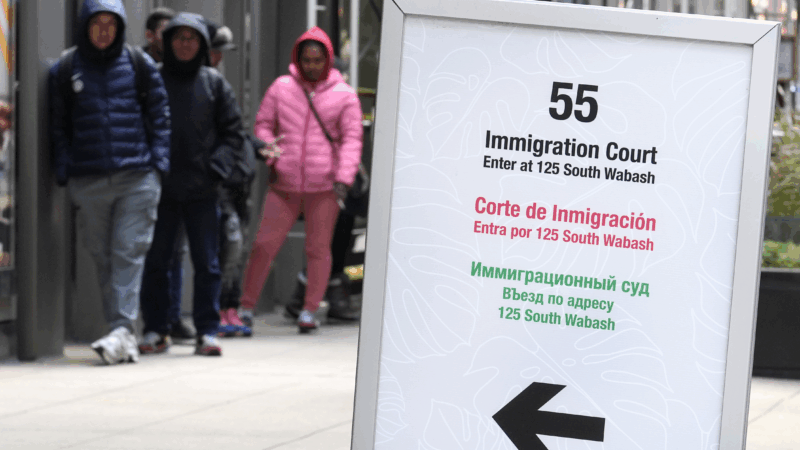11 ways NPR readers resist the impulse to shop (plus, a poem for inspo)
How do you resist that intoxicating urge to buy, buy, buy?
Last month, we asked our NPR audience this question, and dozens of you shared your tips and tricks on exercising self-control while shopping. It was part of our story on how to decide whether to buy something you want but don’t need.
Many of you suggested waiting for a certain time period before buying an item, to make sure you really want it. Others shared clever ways to scratch the itch of shopping without actually spending any money. And one of you even shared a poem on how to shop with more intention.
These responses have been edited for length and clarity.
Turn that impulse to shop into a game
I give myself an imaginary amount to spend — say, $500 — then wander into stores I enjoy and pick out favorite items. But I don’t purchase anything! I get all the rush of shopping and the satisfaction of choosing without spending. It’s really fun. —Monalou Carter
Get your dopamine hit from the library
Go to the library and peruse the aisles. You feel the thrill of the hunt and the joy of acquiring without spending money — and you even learn some things by reading. Bonus: Time spent reading is time not spending money. —Barbara Block
If you’re really feeling spendy, go to a secondhand store
I go to my favorite thrift store and browse for anything that catches my eye. The prices are nominal, often a dollar or two, so I can walk out with an armful of things, like a basket, a picture frame and a pair of bookends, for less than what it would cost me to buy lunch. —Karen Crowell
Let it sit in your online shopping cart for a while
With online shopping, it’s almost too easy to spend money. I will put the item I want in the shopping cart and close out of the site completely. If I’m still thinking about it the next day or week, I’ll go back and buy it. Otherwise, I’ve forgotten about it, and my wallet thanks me for it! —Britta Rodenbeck
Create a wish list (of stuff you’ll eventually forget you wanted)
One of the most practical ways I’ve curbed my spending impulses is by creating a “wishlist” bookmark folder [in my browser] and adding anything I might want to buy to it. I occasionally go into the folder and review what’s in there. Most things I’ve added, I no longer want as much. If something has remained in the folder for a while and I still want it, I might get it for myself as a little treat. —Amanda Collyer
Envision exactly how and when you’ll use it
This is especially true with food items on sale. If I won’t realistically cook and eat it in the next five days, I will stop myself from buying it.
I do the same with clothes. So often, I have nothing to go with what I want to buy or no occasion to wear it. —Michele Mitsumori
A simple tip to try at the grocery store
I make sure I am not hungry when I shop for food. —Pam Hamilton
Just don’t go there
Don’t go into the store, whether it’s brick or virtual, unless you need a particular thing. —Anne Klapste
Don’t get suckered into the marketing
When I encounter sales, I try reframing “discount” as “distraction.” Ask yourself: Is this actually a good deal, or is it pulling me away from what I really need? Sales often create artificial urgency. Your choices deserve to come from intention, not marketing pressure. —Glen Loveland
Discover something deeper that fills you
I used to want things. Pretty things, useful things, things I thought would bring me comfort or joy. But something shifted.
After five years of living as a nomad — sometimes with just a backpack or from the trunk of my car — I’ve come to realize that I no longer desire things. I walk into a store, see an ad or pass by a tempting object, and … nothing. The wanting is gone.
I’ve learned to enjoy other kinds of pleasures: the silence of a forest, the surprise of a hummingbird, the company of a river. They don’t cost a thing, and they leave no weight in my bag.
What would I even do with more stuff? I can’t carry it. My life is movement — light, essential, deliberate.
So my best tip is this: Don’t fight the impulse. Transform it. Discover something deeper that fills you in ways a purchase never could. —Victoria Restrepo
A poem on how to shop more mindfully
Lately I’ve been thinking: How much have I spent on things I ultimately didn’t need or hardly used before they expired, outlived their ability to function or were destroyed by the mere passage of time?
So think twice and mindfully. I’ve put that into verse for you:
Stop the Shop
Shop your closet.
every drawer.
Shop your pantry
and yet more.
Shop your bookshelves.
and garage.
Hello, best self,
‘Bye, garb-ah-ge.
—Genevieve N. Franklin
This story was edited by Meghan Keane The visual editor is Beck Harlan. We’d love to hear from you. Leave us a voicemail at 202-216-9823, or email us at [email protected].
Listen to Life Kit on Apple Podcasts and Spotify, and sign up for our newsletter. Follow us on Instagram: @nprlifekit.
Lindsey Vonn says she suffered ‘complex tibia fracture’ in her Olympic downhill crash
The 41-year-old star said her torn ACL was not a factor in her crash. "While yesterday did not end the way I had hoped, and despite the intense physical pain it caused, I have no regrets," she wrote.
Guerilla Toss embrace the ‘weird’ on new album
On You're Weird Now, the band leans into difference with help from producer Stephen Malkmus.
Nancy Guthrie search enters its second week as a purported deadline looms
"This is very valuable to us, and we will pay," Savannah Guthrie said in a new video message, seeking to communicate with people who say they're holding her mother.
Immigration courts fast-track hearings for Somali asylum claims
Their lawyers fear the notices are merely the first step toward the removal without due process of Somali asylum applicants in the country.
Ilia Malinin’s Olympic backflip made history. But he’s not the first to do it
U.S. figure skating phenom Ilia Malinin did a backflip in his Olympic debut, and another the next day. The controversial move was banned from competition for decades until 2024.
‘Dizzy’ author recounts a decade of being marooned by chronic illness
Rachel Weaver worked for the Forest Service in Alaska where she scaled towering trees to study nature. But in 2006, she woke up and felt like she was being spun in a hurricane. Her memoir is Dizzy.






